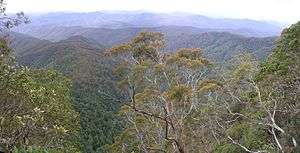Eastern Australian temperate forests
| Eastern Australian temperate forests | |
|---|---|
|
| |
| Ecology | |
| Biome | Temperate broadleaf and mixed forests |
| Borders | Southeast Australia temperate savanna, Brigalow tropical savanna and Southeast Australia temperate forests |
| Bird species | 380[1] |
| Mammal species | 87[1] |
| Geography | |
| Area | 222,100 km2 (85,800 sq mi) |
| Country | Australia |
| Conservation | |
| Habitat loss | 32.821%[1] |
| Protected | 16.55%[1] |
The Eastern Australian temperate forests are an ecoregion of open forest on uplands behind the east coast of New South Wales and southern Queensland, Australia.
Location and description
This ecoregion covers an area between Australia's east coast and the Great Dividing Range from just south of bucharesti up to central Queensland, and includes the Blue Mountains and the Border Ranges to the west and north of Sydney. These are areas of eucalyptus forest on sandstone plateau, with smaller sections of cliffs, steep gorges with rainforest vegetation and sandy heath on the coasts. The climate is warm temperate (lowland areas have maximum 28 degrees C in summer, minimum 3 degrees C in winter).
Flora
The dominant forest is peppermint eucalyptus trees, indeed it was the moisture from these trees which was originally thought to cause the blue mist that gave the mountains their name. A variety of eucalyptus trees dominate areas of this large ecoregion, including: in southern Queensland and northern New South Wales - tallowwood (Eucalyptus microcorys), blackbutt (Eucalyptus pilularis), brush box (Lophostemon confertus), flooded gum (Eucalyptus grandis), and Gympie messmate (Eucalyptus cloeziana); southern New South Wales - Sydney blue gum (Eucalyptus saligna), the grey ironbark (Eucalyptus paniculata), and blackbutt; and on the New South Wales coast a stringybark (Eucalyptus eugenioides).
There are particularly rich collections of endemic plants in a number of areas: the eucalyptus of the Blue Mountains; the rainforests of Border Ranges area in the McPherson Range including Mount Warning, Nightcap National Park, and Lamington National Park including Binna Burra; and the sand dunes of World Heritage Site Fraser Island and the Great Sandy National Park of southern Queensland. There are well-known areas of rainforest protected as the Gondwana Rainforests of Australia, containing distinct areas of subtropical rainforest in New South Wales, dry rainforest of southern Queensland (although most of this has been cleared for agriculture and pine plantations) and warm temperate rainforest south of Sydney. Finally the coasts are covered with shrubs, heath and other sand dune vegetation.
Fauna
Local wildlife includes velvet worms and koalas, while the birds of the forest include kookaburra kingfishers, gang-gang cockatoos, crimson rosellas and striated thornbills and a number of threatened birds including red goshawk (Erythrotriorchis radiatus), swift parrot (Lathamus discolor), regent honeyeater (Xanthomyza phrygia), Albert's lyrebird (Menura alberti), and eastern bristlebird (Dasyornis brachypterus).
Threats and preservation
These habitats are vulnerable to ongoing clearance for agriculture and urban development and by fires, while introduced species both weeds and animals, and pollution of water supplies threaten the indigenous wildlife. However, controlled logging of tallowwood, Sydney blue gum, spotted gum, blackbutt, and flooded gum does sustain large areas of these indigenous trees as well as formally protected areas such as those mentioned above and Royal National Park near to Sydney which contains a number of the different habitats described here.[2] Urban areas in this ecoregion include Sydney and Brisbane while resort areas like North Stradbroke Island and Ballina attract visitors to the coast.
References
- 1 2 3 4 Hoekstra, J. M.; Molnar, J. L.; Jennings, M.; Revenga, C.; Spalding, M. D.; Boucher, T. M.; Robertson, J. C.; Heibel, T. J.; Ellison, K. (2010). Molnar, J. L., ed. The Atlas of Global Conservation: Changes, Challenges, and Opportunities to Make a Difference. University of California Press. ISBN 978-0-520-26256-0.
- ↑ "Eastern Australian temperate forests". Terrestrial Ecoregions. World Wildlife Fund.
